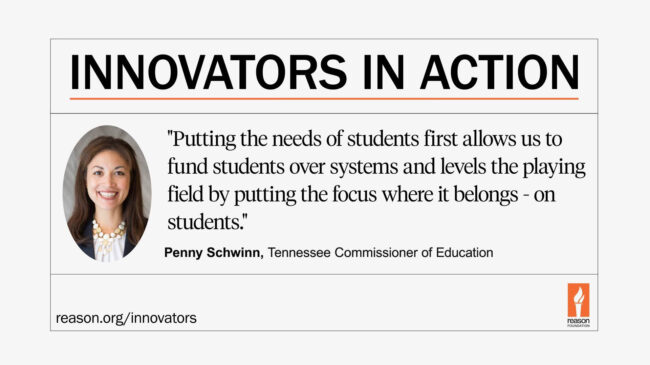In October 2021, Tennessee Gov. Bill Lee and Commissioner of Education Penny Schwinn announced a comprehensive review of the state’s K-12 school finance system, including plans to explore options for adopting a student-centered funding approach.
This was welcomed news, as Tennessee is one of only a handful of states that employ an outdated resource-based model for delivering education funds to school districts. In Tennessee today, only three percent of state and local operating dollars are allocated based on student characteristics, with the state’s Basic Education Program (BEP) formula currently tying funding to inputs such as administrative staff counts, textbooks and counselors. Not only does this diminish transparency, but it also means policymakers lack an effective lever for targeting dollars to the students who need them most.
After months of public engagement, the Tennessee Investment in Student Achievement proposal was recently released and features a weighted-student formula that would replace the state’s decades-old BEP model. We recently caught up with Commissioner Schwinn to learn more about this historic effort and what its prospects are for the 2022 legislative session.
Smith: There’s widespread agreement that Tennessee’s current education funding system is broken. What’s wrong with the Basic Education Program (BEP) formula that the state uses to fund schools today?
Schwinn: The Basic Education Program that currently funds Tennessee’s public schools is an outdated formula that is 30 years old. It is difficult to understand, offers little transparency and there’s very minimal accountability measures associated with it. After years of conversations and a robust public engagement process launched by Gov. Bill Lee in fall 2021, the state resoundingly heard similar feedback that the state needs to focus public education funding on funding the needs of students. Currently, 38 states have already transitioned to a student-based funding formula for public school education. Under the new proposed formula, dollars would follow students as long as they attend a public school in Tennessee.
Additionally, we know that students have different needs. We need a public education funding formula that takes those specialized needs into account and gives added weights to students based on those needs. Some basic examples would be students with special needs who require more instructional time and smaller classrooms, students who are English learners, or CTE and advanced placement courses.
Putting the needs of students first allows us to fund students over systems and levels the playing field by putting the focus where it belongs- on students.
Smith: In October, you and Gov. Lee called for a full review of Tennessee’s education funding formula that included 18 subcommittees, public town halls, and surveys. What did you learn from this engagement process?
Schwinn: Tennessee knows what we want to see in a K-12 public education funding formula which was shown in the consistency of feedback we have received throughout the state. And now is the time to act. By launching a fully public engagement process, hosting in-person and Twitter town halls, and forming subcommittees with stakeholders from across the state, we learned that Tennesseans have a clear goal and desire for how we should fund our students and public education. From the more than 1,300 public comments and over 100 subcommittee meetings, we heard many of the same ideas from a multitude of sources. Stakeholders want increased support for students with special needs, improved wraparound services, additional funding for CTE, adequate funding for transportation needs, and more. The engagement process taught us that Tennesseans are engaged and focused on providing the best possible education for our kids to put them on successful pathways for college and career readiness.
“Putting the needs of students first allows us to fund students over systems and levels the playing field by putting the focus where it belongs – on students.”
– Penny Schwinn, Commissioner of Education
Smith: What are the key features and benefits of your proposal to overhaul the state’s funding formula?
Schwinn: The new proposal, the Tennessee Investment in Student Achievement (TISA), is a student-based funding formula that will meet each individual student’s needs. It includes various proposed investments for components like $6.6 billion for base funding for every public school student, $1.8 billion in additional funding to be allocated based on weights to address specific student needs, $376 million in direct funding for students to receive additional funding allocations to support specific programs like tutoring and $100 million in outcomes funding to be awarded based on achievement to empower schools to help all students reach their full potential.
Additionally, the TISA has reporting and district accountability requirements. These include an annual TISA report delivered to the Tennessee General Assembly by the department and individual district-level accountability reports to be submitted by local school boards to the department to establish goals for student achievement in the current school year. The reports will also explain how the goals can be met within the local budget, and describe how the local budget and expenditures for prior school years enabled districts to progress student outcomes.
Smith: Some have expressed concern that the reform effort is moving too quickly. What is your response to them?
Schwinn: Our goal in this public process was to create a new public school formula to best serve all Tennessee students. In the two previous administrations, discussions were had to revise the current formula, and much of the feedback we have heard mirrors the same things that were being discussed then, indicating that a student-based formula is what Tennesseans want. Additionally, it is aligned with Gov. Lee’s priorities to keep students at the center and ensure the funding process is transparent. Now is the time to do what is best for our kids.
Smith: What obstacles stand in the way of getting funding reform across the finish line in 2022?
Schwinn: The draft legislation is making its way through the state legislative process. The department is ready and willing to work with the seven house and senate committees as they consider passing the TISA Act this session to answer questions about how the TISA will benefit their local students.
“Providing open access to fully public discussions where all Tennesseans could share their thoughts, ideas, hopes and dreams for education was essential.”
– Penny Schwinn, Commissioner of Education
Smith: What advice would you give to policymakers in other states who are looking to reform their school finance systems?
Schwinn: What was reinforced is that transparency and open discussion are so important. Providing open access to fully public discussions where all Tennesseans could share their thoughts, ideas, hopes and dreams for education was essential. By listening to and collecting feedback from the general public and going through multiple levels of reviews by the 18 subcommittees, Tennessee is in a place to establish a student-based public school funding formula that serves the needs of all students.

